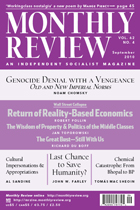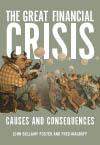|

October 2010,
Volume 62, Number 5
c o n t e n t s
»notes from the editors
To understand the disaster that is present-day economics, it is crucial to recognize that we are living today, not only in the deepest economic crisis/stagnation since the Great Depression, but also—as Paul Krugman declared in his New York Times blog on January 27, 2009—in “A Dark Age of Macroeconomics,” in which the central discoveries of the 1930s have been forgotten or discarded.… The critical knowledge lost that gave rise to the new Dark Age in Macroeconomics, he claimed, was none other than the Keynesian Revolution centered on the critique of Say’s Law, or the notion that supply creates its own demand. In the context of arguing against government deficit spending, leading economists at the University of Chicago, the bastion of reaction in economics, have reverted to a “pure Say’s Law, pure ‘Treasury view’” by insisting that increased savings automatically lead to increased investment, while government borrowing invariably “crowds out” investment.… | more |
Review of the Month:
The Financialization of Accumulation
John Bellamy Foster�
In 1997, in his last published article, Paul Sweezy referred to “the financialization of the capital accumulation process” as one of the three main economic tendencies at the turn of the century…. All traditions of economics, to varying degrees, have sought to separate out analytically the role of finance from the “real economy.” Accumulation is conceived as real capital formation, which increases overall economic output, as opposed to the appreciation of financial assets, which increases wealth claims but not output. In highlighting the financialization of accumulation, Sweezy was therefore pointing to what can be regarded as “the enigma of capital” in our time.… Now more than ever, as Marx said, “an accumulation of debts” appears as “an accumulation of capital,” with the former increasingly effacing the latter.… | more |
The Crisis of Capitalism in Europe, West and East
Özlem Onaran��
Capitalism is facing a major realization crisis—an inability to sell the output produced, i.e., to realize, in the form of profits, the surplus value extracted from workers’ labor. Neoliberalism can be viewed as an attempt initially to solve the stagflation crisis of the 1970s by abandoning the “Keynesian consensus” of the “golden age” of capitalism…, via an attack on labor.… However, the system’s success, partially due to neoliberalism, in reviving profits engendered a potential realization crisis, due to low wages and investment.… | more |
Equality and Rights for Immigrants—the Key to Organizing Unions
David Bacon��
Organizing immigrant communities is not a matter of taking pity on the downtrodden. It is a matter of understanding what is necessary for the survival of our communities, of our labor movement. If we are serious in wanting to build political power, then we must incorporate migrant workers, fight for their rights, and make the movement for social justice one that belongs to all of us, documented and undocumented.… | more |
�
Poetry:
Two Poems
Marilyn Buck��
When Marilyn Buck died last August 3, she had lived outside prison, on parole, for only twenty days. At age sixty-two, she had spent her last twenty-five years in various maximum security prisons. Before that, she lived years underground, supporting and taking part in actions with the Black Panther Party and later, the Black Liberation Army. Marilyn was a white woman who carried a great deal of pain, most of which came from her unflinching acknowledgement of the centuries of untold inequities suffered by African Americans and other people of color at the hands of “freedom-loving” white America.… | more |
The Great Financial Crisis—Three Years On
John Bellamy Foster and Fred Magdoff���
The Great Financial Crisis began in the summer of 2007 and three years later, despite a putative “recovery,” it is still having profound effects in the United States, Europe, and in much of the world. Austerity is being forced on working people in many countries.… Much of the attention devoted to determining the cause of the crisis has been directed at the role of “subprime” mortgages in the United States that were sold to low-income people who had little chance of being able to pay the mortgages on their homes. …despite the instability generated by such loans, and a whole host of exotic financial instruments associated with them, the very severity of the Great Financial Crisis suggests that it was not primarily a product of such speculative practices. Rather, it was the outcome in the main of long-term structural factors, reflected in the secular decline in economic growth rates and the long-run increase of financial fragility and instability.… | more |
Review:
New This Week!
Red Cop in Red China
Jonah Raskin��
Review of Qiu Xiaolong, Death of a Red Heroine (2000), 464 pages, $14.00; A Loyal Character Dancer (2002), 360 pages, $14.00; When Red Is Black (2004), 320 pages, $13.00, all published in New York by Soho Crime; and A Case of Two Cities (2006), 320 pages, $13.95; Red Mandarin Dress (2007), 320 pages, $13.95; The Mao Case (2009), 304 pages, $13.99, all published in New York by Minotaur Books.… | more |

September 2010,
Volume 62, Number 4
c o n t e n t s
»notes from the editors
During the period stretching from the 1970s through the 1990s, Monthly Review, under the editorship of Harry Magdoff and Paul Sweezy, stood apart in its analysis of the tendency to economic stagnation in advanced capitalism and its view that the economic slowdown beginning in the 1970s was a manifestation of this secular tendency. The financial explosion that also emerged in these years was seen as an attempt by the system to stave off stagnation by means of credit-debt expansion, but at the cost of increasing financial fragility.…Younger left economists….sometimes voiced concerns that MR was becoming repetitive, even obsessive, in its focus on stagnation (reinforced by financialization) as “the normal tendency” of monopoly capitalism. When such concerns and their ramifications for the magazine were raised at an MR meeting in the late l980s, Sweezy…simply smiled and good-humoredly said: “Then we will just have to repeat it more. They’ll find out soon enough.”… | more |
Review of the Month:
The Wall Street Collapse and Return of Reality-Based Economics
Robert Pollin�
Over the past generation, the U.S. economy as well as most of the rest of the global economy have been dominated by the idea that free market capitalism produces dynamic growth, financial stability, and as close as we are likely to come to a fair society. Supporters of this pro-market framework hold that government interventions to encourage growth, stability, or even fairness will almost always produce more harm than good. This mode of thinking has been the intellectual foundation for the era of financial deregulation in the United States—the dismantling of the Glass-Steagall regulatory system that was built amid the rubble of the 1929 stock market crash and ensuing 1930s Depression.…in the recent aftermath of the most profound financial market crisis since the 1930s, it is clear that the case in behalf of unregulated financial markets has collapsed as decisively as did the markets themselves.…Moreover, the 2008-09 collapse was no mere aberration. Financial crises have been a regular feature of the United States and global economic landscape since the push to deregulate began in earnest in the late 1970s.… | more |
The Wisdom of Property and the Politics of the Middle Classes
Jan Toporowski�
At the end of the twentieth century, while financial economists satisfied their intellectual pretensions to useful knowledge by conjuring up visions of a world peopled with materialistic consumer-investors optimizing rationally in accordance with their willingness to hazard their wealth, the propertied classes themselves were succumbing to new delusions fostered by the financial markets. The reasoned response of propertied individuals to their experience of the world of speculative finance has created a new political culture with important consequences for the political economy of capitalism.
… | more |
Genocide Denial with a Vengeance: Old and New Imperial Norms
Noam Chomsky�
Perhaps the most shattering lesson from [the] powerful inquiry [of Edward S. Herman and David Peterson in The Politics of Genocide] is that the end of the Cold War opened the way to an era of virtual Holocaust denial. As the authors put it, more temperately, “During the past several decades, the word ‘genocide’ has increased in frequency of use and recklessness of application, so much so that the crime of the 20th Century for which the term originally was coined often appears debased.” Current usage, they show, is an insult to the memory of victims of the Nazis.… | more |
Chemical Catastrophe: From Bhopal to BP Texas City
Tomás Mac Sheoin�
Bhopal has become the prototype of chemical catastrophes, against which all others are compared. Themes that constantly reappear in accounts of these catastrophes—corporations denying responsibility and blaming workers and victims; critics highlighting corporate responsibility for decisions resulting in faulty equipment; inadequate maintenance; staff and training cuts; and neglect by state regulators—can all be found in Bhopal.…Increased regulation since Bhopal has not prevented the continued occurrence of toxic chemical incidents.…Indeed process safety specialists and regulatory authorities point out that incidents resulting from the same underlying causes that resulted in the Bhopal catastrophe continue to recur…[This is illustrated by] two recent catastrophes in the United States.… | more |
Cultural Impersonations and Appropriations: A Fashion Report
Al Sandine�
Growing up on a Midwestern farm while Marx worked on the final draft of Capital, Vol. I, was a boy who, as a man, would have a very different take on the relationship of workers to the products of their labor. Thorstein Veblen would become famous for what he wrote about the fetishized commodities of consumers.…For Veblen, all the nonessentials that we purchase as consumers reflect standards of respectability established by the upper class. The “motive that lies at the root of ownership is emulation,” he wrote, not just of others but of wealthy and powerful others. Under capitalism, one’s property “becomes the conventional basis of esteem,” by which Veblen meant both the high regard of others and self-esteem.…Over the past few decades, however, standards for personal appearance have been transformed in ways that seem to turn Veblen’s conspicuous consumption idea inside out.… | more |
Poetry:
Workingclass nostalgia
Marge Piercy�
Marge Piercy (www.margepiercy.com) is the author of seventeen novels, most recently Sex Wars; seventeen volumes of poetry, most recently The Crooked Inheritance; a memoir, Sleeping with Cats; and two nonfiction books. Knopf will publish her second volume of selected poems, The Hunger Moon: Selected Poems, 1980-2010, next March. … | more |
Reviews:
Our Last Chance to Save Humanity?
John W. Farley
James Hansen, Storms of My Grandchildren: The Truth About the Coming Climate Catastrophe and Our Last Chance to Save Humanity (New York: Bloomsbury Press, 2009), 320 pages, $25.00, hardcover.
James Hansen, one of the world’s most distinguished climate scientists, has written an important book about the threat posed by climate change. The title, Storms of My Grandchildren, refers to the prediction of more powerful and more damaging storms in a warmer, future earth. Subtitled The Truth About the Coming Climate Catastrophe and Our Last Chance to Save Humanity, the book is written for a lay public and is certain to be controversial.… | more |
A History of the Great Bust—Still With Us
Richard Du Boff
Michael Perelman, The Confiscation of American Prosperity. From Right-Wing Extremism and Economic Ideology to the Next Great Depression (New York: Palgrave Macmillan, 2007), 239 pages, $53.00 hardcover.
Yves Smith, Econned: How Unenlightened Self Interest Undermined Democracy and Corrupted Capitalism (New York: Palgrave Macmillan, 2010), 362 pages, $30 hardcover.
Some forty years ago, the American business empire viewed itself as under siege as a result of government interventions threatening its freedom of action…A conglomerate of right-wing forces proceeded to declare war on the social reforms and institutions that had taken shape since the 1930s under the wing of an expanding federal government.…As an operation in national politics, that war can be ranked among the most successful in U.S. history, and, in their lucid moments, its proponents must look back on it with some disbelief.… | more |

July-August 2010,
Volume 62, Number 3
c o n t e n t s
»notes from the editors
For those wishing to understand the theory and practice of “socialism for the 21st century,” the publication this summer of Michael Lebowitz’s The Socialist Alternative: Real Human Development (Monthly Review Press) is a major event. Like Marta Harnecker, whose work, “Latin America and Twenty-First Century Socialism: Inventing to Avoid Mistakes,” forms the content of this issue of Monthly Review, Lebowitz is associated with the Centro Internacional Miranda research institute in Venezuela, is an advisor to President Hugo Chávez, and is a major Marxian theorist and political economist. He is also author of Beyond Capital: Marx’s Political Economy of the Working Class, and, more recently, Build it Now (Monthly Review Press, 2006).… | more |
Foreword to the Summer Issue
John Bellamy Foster
In the eyes of much of the world, the year 1989 has come to stand for the fall of the Berlin Wall, the demise of Soviet-type societies, and the defeat of twentieth-century socialism. However, 1989 for many others, particularly in Spanish-speaking countries, is also associated with the beginning of the Latin American revolt against neoliberal shock therapy and the emergence in the years that followed of a “socialism for the 21st century.” This revolutionary turning point in Latin American (and world) history is known as the Caracazo or Sacudón (heavy riot), which erupted in Caracas, Venezuela on February 27, 1989, and quickly became “by far the most massive and severely repressed riot in the history of Latin America.”… | more |
Latin America & Twenty-First Century Socialism: Inventing to Avoid Mistakes
Marta Harnecker� (Bio)
Translated by Janet Duckworth
Twenty years ago, left forces in Latin America and in the world in general were going through a difficult period. The Berlin Wall had fallen; the Soviet Union hurtled into an abyss and disappeared completely by the end of 1991. Deprived of the rearguard it needed, the Sandinista Revolution was defeated at the polls in February 1990, and Central American guerrilla movements were forced to demobilize. The only country that kept the banners of revolution flying was Cuba, although all the omens said that its days were numbered. Given that situation, it was difficult to imagine that twenty years later, left-wing leaders would govern most of the Latin American countries.
… | more |
Latin America was the first region in the world where neoliberal policies were introduced. Chile, my country, was used as a testing ground before Prime Minister Margaret Thatcher’s government implemented them in the United Kingdom. But Latin America was also the first region in the world where these policies came to be rejected as policies that only served to increase poverty, aggravate social inequalities, destroy the environment, and weaken working-class and popular movements in general.
It was in our subcontinent that left and progressive forces first began to rally after the collapse of socialism in Eastern Europe and the Soviet Union. After more than two decades of suffering, new hope was born. At first, this took the shape of struggles to resist neoliberal policies, but after a few years, people went on the offensive, conquering arenas of power.… | more |
The map of Latin America has radically changed. A new balance of forces makes it more difficult for the United States to achieve its objectives in the region. At the same time, however, the attempts of the Empire to the North to stop the forward march of our countries have increased.… | more |
…in the last ten years, progressive and left sectors have been winning more and more governments in the region. Various analysts have made an effort to classify governments by drawing up different typologies. We can initially distinguish two large blocs: right, or conservative, governments that seek to retrofit neoliberalism, and governments that define themselves as “on the left” or “center-left” and are looking for alternatives to neoliberalism.…
| more |
…to refer to that group of governments that wins elections by raising anti-neoliberal banners, we shall speak of the “left,” in quotation marks. We leave to the reader the task of classifying them according to the series of criteria which we list below.
| more |
“Why talk of socialism?” we may ask. After all, “socialism” has had such negative connotations since its collapse in the Soviet Union and other Eastern European countries. For many years after Soviet socialism disappeared, intellectuals and progressive forces talked more of what socialism must not be than of the model that we actually wanted to build. Some of the facets of Soviet socialism that were rejected—and rightly so—were: statism, state capitalism, totalitarianism, bureaucratic central planning, the kind of collectivism that seeks to homogenize without respecting differences, productivism (which stresses the growth of productive forces without being concerned about the need to protect nature), dogmatism, atheism, and the need for a single party to lead the transition process.…| more |
We should distinguish three kinds of transition to socialism: transition in advanced countries, transition in backward countries where state power has been conquered, and finally, transition in countries where only the government is in our hands.…Marx and his followers thought that socialism would start in the more advanced countries, where capitalism itself had created the material and cultural conditions for it. Revolutionary access to state power was thought to be the sine qua non which would make it possible to expropriate from the expropriators, create producer associations, and convert the state into an expression of society instead of a body above it.…| more |
In what follows, I shall present some of the features that, according to the opinions of several thinkers and political leaders, should be characteristic of twenty-first century socialism. In fact, they restate many of Marx’s original ideas.…Our socialist conception does not, unlike the capitalist, start off with the idea of people as individual beings isolated, separated from others, but with the idea of people as social beings, who can only develop themselves if they develop together with others.…| more |
Twenty-first century socialism proposes a new model to replace the neoliberal capitalist model.…The new economic model to be built must be extremely mindful of the ecological crisis and the struggle against consumerism. We must promote the idea that our goal, as Bolivian President Evo Morales says, is not to live better but to live well. The indigenous communities’ traditional practices have a positive attitude toward nature, and we must rescue and respect it.…| more |
Thus far, I have given a broad overview of some of the characteristics of twenty-first century socialism. Now I will go into some of the concrete measures that—using the state bequeathed to us but run by revolutionary cadres—can be taken, in order to move toward that goal, provided that the political will to do so exists
…| more |
Historical experience shows that the intervention of the state or government to push forward the transition to socialism is crucial. Why is this state intervention necessary? Did this happen with capitalism, too?…No, the historical process of capitalist development was very different. Capitalist relations of production were born in the bosom of precapitalist societies, and the only mission of bourgeois revolutions was to conquer political power and then use it to foster the expansion of this mode of production, which has its own logic of development.…| more |
One of the deviations that did the most damage in the historical experience of Soviet socialism was bureaucratism. Bureaucratism destroys the people’s energy and creativity, and, as the people are the real builders of the new society, it prevents the goal of twenty-first century socialism from being reached. The goal is that women and men develop themselves completely through revolutionary practice itself.
My reflections on the kind of political instrument needed to build twenty-first century socialism are intended to contribute to a larger body of thought about the horizon toward which a growing number of Latin American governments are moving. I conclude by emphasizing the need for a new left culture, a tolerant and pluralist culture that stresses that which unites us rather than that which divides us. A culture that promotes unity around values—such as solidarity, humanism, respect for difference, and protection of the environment—and turns its back on the view that hunger for profit and the laws of the market are the guiding principles of human activity.

June 2010,
Volume 62, Number 2
c o n t e n t s
»notes from the editors
The World People’s Conference on Climate Change and the Rights of Mother Earth held April 20-22, 2010, in Cochabamba, Bolivia, will undoubtedly be remembered as a major historical turning point in the struggle over climate change. Over 35,000 people from 142 countries attended….For perhaps the first time, the issue of the planetary environmental crisis was wrested entirely from the ideological control of the rich countries of the North in a major international forum, leading to the development of a radical South-based perspective.… | more |
Review of the Month:
Capitalism, the Absurd System: A View from the United States
Robert W. McChesney and John Bellamy Foster
Perhaps nothing points so clearly to the alienated nature of politics in the present day United States as the fact that capitalism, the economic system that drives the society, is effectively off-limits to critical review or discussion. To the extent that capitalism is mentioned by politicians or pundits, it is regarded in hushed tones of reverence for the genius of the market, its unquestioned efficiency, and its providential authority. One might quibble with a corrupt and greedy CEO or a regrettable loss of jobs, but the superiority and necessity of capitalism—or, more likely, its euphemism, the so-called “free market system”—is simply beyond debate or even consideration. There are, of course, those who believe that the system needs more regulation and that there is room for all sorts of fine-tuning. Nevertheless, there is no questioning of the basics.… | more |
South Africa’s Bubble Meets Boiling Urban Social Protest
Patrick Bond�
As the June-July 2010 World Cup draws the world’s attention to South Africa, the country’s poor and working-class people will continue protesting, at what is now among the highest rates per person in the world. Since 2005, the police have conservatively measured an annual average of more than eight thousand “Gatherings Act” incidents (public demonstrations legally defined as involving upwards of fifteen demonstrators) by an angry urban populace….This general urban uprising has included resistance to the commodification of life—e.g., commercialization of municipal services—and to rising poverty and inequality in the country’s slums.… | more |
Awakening in Oaxaca: Stirrings of the People’s Giant
Robert Joe Stout�
The medieval kingdom that is twentieth century Oaxaca has imprisoned hundreds of citizens arbitrarily and unjustly. Dozens more have disappeared, victims of paramilitary escuadrones de muerte (death squads). Thousands have been beaten, tortured, and robbed, lost their jobs, or have been forced into exile because they objected to government wrongdoing.…The King’s minions who control Oaxaca’s political and economic systems are a small minority of the state’s population, “but they are a powerful minority. There is no transparency. The governor arranges, controls, dispenses as he wishes—he is the head cacique, he has the legislature and the judicial system in his pocket.” Change means overthrowing the governor and the system of government that he manifests and represents. … | more |
El Salvador: Mining the Resistance
Gabriel Zucker�
“Ultimately,” said Miguel Rivera, a soft-spoken man in his late twenties, “we are a family that has dedicated ourselves to helping the people with their needs and defending their rights. But in the process of denouncing the consequences of mining especially, I think there are people that will be your enemies.”…The Canadian-owned Pacific Rim Mining Company has attempted to exploit a gold mine at El Dorado for the better part of a decade, and has been repeatedly thwarted in its efforts….Now, apparently, the company’s local allies have taken a more violent approach to removing that opposition.… | more |
Reviews:
Time to Pay the Piper
Rebecca Clausen�
Ariel Salleh, ed., Eco-Sufficiency and Global Justice: Women Write Political Ecology (New York: Pluto Press, 2009), 324 pages, $34.00, paperback.
In 2001, Wilma Dunaway wrote that the “tentacles of the world-system are entwined around the bodies of women.” Yet her literary analysis revealed a profound silence about the role of women in reproductive labor, subsistence households, and commodity chain analysis. Dunaway characterized this omission as, “the greatest intellectual and political blunder” in her field.…Nearly ten years later, Ariel Salleh has answered this unspoken call with the resounding voices of seventeen feminist scholars who address transdisciplinary issues of global political ecology.
… | more |
Sartre: Conversations with a “Bourgeois Revolutionary”
Joseph L. Walsh�
John Gerassi, Talking with Sartre: Conversations and Debates, edited and translated by John Gerassi (New Haven, CT: Yale University Press, 2009), 336 pages, $20.00, paperback.
“I want to know, Sartre, how a bourgeois like you—and you, Sartre, no matter how much you hate the bourgeoisie are still a bourgeois through and through—became a revolutionary.” In this way, John Gerassi once informed an audience of Jean-Paul Sartre scholars and aficionados about what to expect from the 2,000-plus pages of edited transcripts of his conversations with Sartre, taped from 1970 to 1974 and recently deposited in the Yale University library.… | more |
|













































